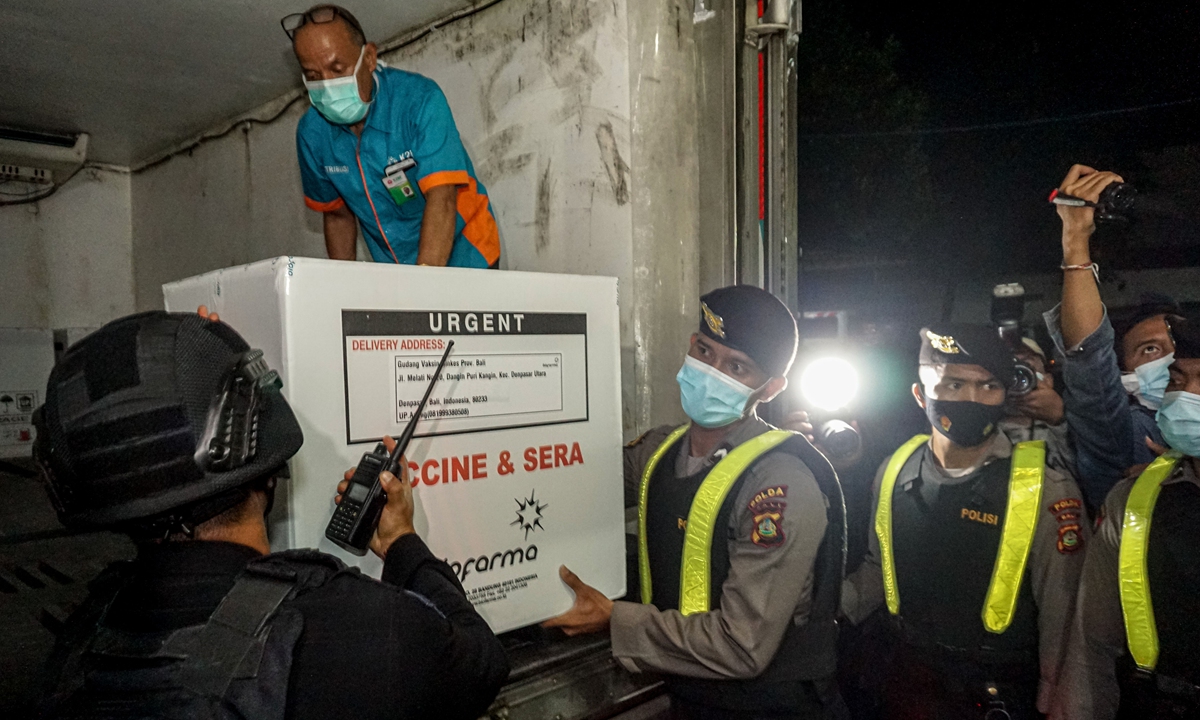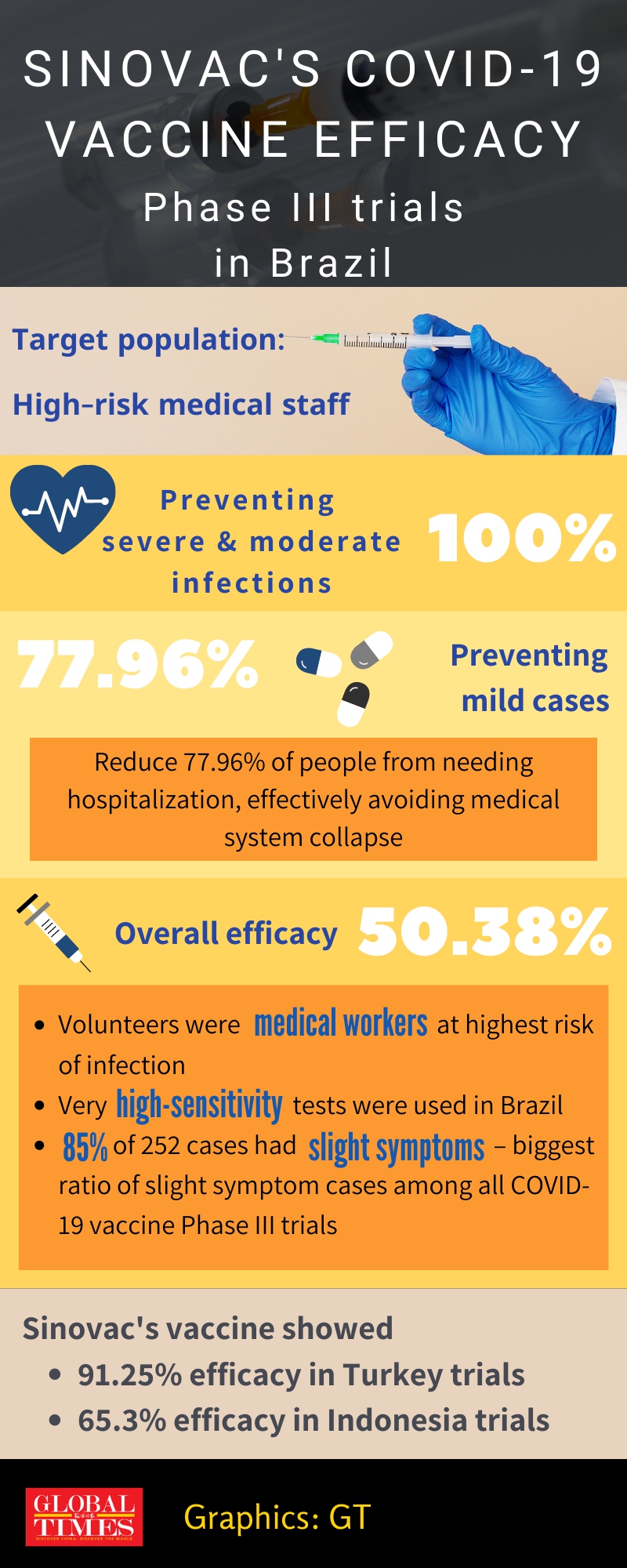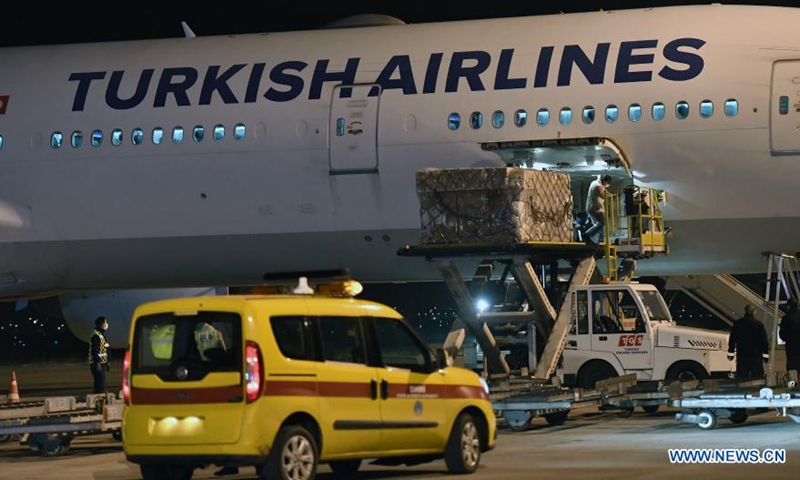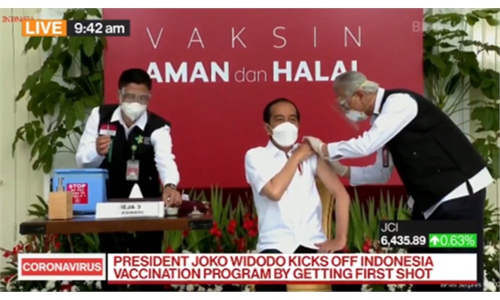
Workers in Indonesia load over 760,000 doses of COVID-19 vaccine developed by Chinese pharmaceutical company Sinovac early Tuesday morning. The vaccines are expected to be distributed to 34 Indonesian provinces as part of the country's mass vaccinations efforts, with President Joko Widodo set to be given the first shot. Photo: Xinhua
China's CoronaVac COVID-19 vaccine produced by Sinovac has been proven safe and effective after phase III trials conducted in several countries, boosting public confidence over its global rollout as Indonesian President Joko Widodo received his first shot of the CoronaVac vaccine on Wednesday.
Sinovac's COVID-19 vaccine is 100 percent effective in preventing severe and moderate infections, 77.96 percent effective in preventing mild cases, and has an overall efficacy of 50.4 percent in Brazil's final-stage trials, according to researchers in Brazil on Tuesday.
Experts said the result is "good enough" considering almost all the trial participants in Brazil were high-risk medical workers, and the 77.96 efficacy for mild-case protection means the vaccine will reduce the amount of people needing hospitalization by 78 percent.
Given that medical facilities still face pressure amid a resurgence in cases, such a vaccine is fairly valuable to effectively avoid medical system collapse, experts noted.
The launch of mass vaccinations for emergency use with CoronaVac in both Indonesia and Turkey shows the overall efficacy rate at 50.4 will not undermine trust in the shots and will not dampen potential users' commitment to purchase them, observers said in response to the Western media's latest round of taking aim at Chinese vaccines' overall safety and efficacy.
Turkey on Wednesday reportedly approved the emergency use of the CoronaVac vaccine. Turkey has agreed to purchase 50 million doses of Sinovac's CoronaVac vaccine and has taken delivery of an initial 3 million doses, Reuters reported.
Yin Weidong, CEO of Chinese vaccine producer Sinovac Biotech, on Wednesday stressed that CoronaVac's vaccine is effective and safe at a press conference.
His comments came after Indonesia's president received the first dose of CoronaVac, on Wednesday, the first person in Indonesia' to be vaccinated.
Sinovac has already delivered more than seven million vaccine doses in the Chinese mainland and applied for registration documents in Hong Kong to supply 1 million doses there. The pharmaceutical company will deliver those vaccines on time, Yin said.

Graphic: GT
Higher efficacy for the public
Volunteers for Sinovac's vaccine in Brazil are all medical workers who are at the highest risk of infection. It is also the world's first Phase III clinical trials conducted only among medical workers, Sinovac told the Global Times on Tuesday.
"The vaccine was able to 100 percent prevent severe illness in such a high-risk population, and effectively control morbidity, and protect at least 50 percent of people from infection, which is good enough," Wang Guiqiang, director of the Infectious Disease Department at Peking University First Hospital, told the Global Times on Tuesday.
Vaccine efficacy data on the highest risk groups has been scarce internationally, and CoronaVac's results fill this gap and have determined the effectiveness of protection for this top priority group, which is the most valuable part of the study, Shao Yiming, one of the vaccine developers and an AIDS expert at the Chinese Center for Disease Control and Prevention, told the Global Times on Wednesday.
"Currently, the manufacturer requires a 0-14 vaccination doses program (Day 1 for first dose, Day 14 for second dose), but this probably can't bring the highest level of antibodies which then partly lowered the efficacy result. That's why some manufacturers ask for a 0-21 vaccination program," Wang said.
Sinovac's vaccine has been undergoing Phase III clinical trials in Brazil, Indonesia and Turkey, which have resulted in various efficacy figures based on their own domestic conditions - 91.3 percent in Turkey and 100 percent protection against severe symptoms, 78 percent for mild cases in Brazil and 65.3 percent in Indonesia.
"Given the severity of the epidemic in Brazil, local researchers used the shortest 0-14 vaccination program in a bid to protect as many medics as possible," Shao said.
He predicts that higher effectiveness of the CoronaVac will be seen in community use for the general population, especially if they use the 0-21 vaccination program, which can likely reach efficacy of between 70 to 80 percent.
"This is basically in line with our expectations, so it will not slow down the pace of national immunization in China," Shao noted. China has administered over 10 million COVID-19 vaccine doses so far, health officials said on Wednesday.
Medical workers are at risk of high exposure, which would decrease the vaccine's protection efficacy, Shao said, citing an example of previous international Phase III clinical trials on an AIDS vaccine. Notably, the infection risk of Sinovac's trial environment is three times higher than Pfizer's and six times higher than Moderna's.
The core criteria for evaluating a vaccine outlines not only efficacy, but also safety and accessibility, which Chinese vaccines present a comparative edge in, either in its mature technology compared to the unprecedented mRNA type or its less-demanding transportation requirements.
CoronaVac has proven its safety as Brazil's trials have reported rare adverse reaction cases and no severe events associated with the vaccine, according to Dimas Covas, director of the Butantan Institute, which cooperated with Sinovac on the trials in Brazil.
"It's not the best vaccine, but it is accepted by the international community, by the WHO. This is a vaccine compatible with our local production, our cold chain, our distribution," Natalia Pasternak, Brazilian immunological expert, said at a media conference on Tuesday.
"We never said we needed a perfect vaccine. We needed a vaccine that would allow us the process of control of the pandemic," said Pasternak. "If the risk is close to zero and the benefits of the collective public health to reduce the risk of the disease of 50 percent, there is no justification not to use this vaccine."

Workers unload boxes of China's SinoVac COVID-19 vaccine at Esenboga Airport in Ankara, Turkey, Dec. 30, 2020. The first batch of 3 million doses of China's SinoVac COVID-19 vaccine arrived in the Turkish capital Ankara early Wednesday. Mass vaccination will start following 14 days of tests, Turkish Health Minister Fahrettin Koca tweeted Wednesday. (Photo by Mustafa Kaya/Xinhua)
Wider demographics in trials
Five COVID-19 vaccines in the world have revealed their efficacy against COVID-19, including two Chinese vaccines separately developed by Sinovac and Sinopharm.
Sinopharm developed two inactivated vaccines that underwent Phase III clinical trials in 10 countries covering about 50,000 participants.
Sinovac's CoronaVac now plans to extend trials groups to children and pregnant women, Brazilian health officials said on Tuesday.
More diverse demographics in the trials make the Chinese vaccines more reliable than others in applying to a wider range of people, Zhuang Shilihe, a Guangzhou-based vaccine doctor, told the Global Times on Friday.
Among the five, Pfizer and Moderna have shown efficacy of about 95 percent.
Pfizer carried out 150 Phase III clinical trials on its mRNA vaccine, BNT162b2, in the US, Germany, Turkey, South Africa, Brazil and Argentina, involving more than 44,000 participants aged 16 years and older.
But the WHO does not recommend the BNT162b2 vaccines for specific populations, including people with a history of severe allergies, most pregnant women, international travelers who are not part of a priority groups, and children under 16.
Another mRNA vaccine used in the US developed by Moderna conducted final-stage trials on 30,000 participants in the US aged 18 and older.
However, the high efficacies are not free from questions. Doubts about the safety and severity of adverse reactions and whether it has been tested on enough people loom large, especially following reports of vaccines allegedly leading to facial paralysis in four people in Australia although the US Food and Drug Administration said they found no evidence to support such a connection.
Another foreign candidate that has been approved for emergency use in multiple countries is a recombinant adenovirus vector developed by Oxford/AstraZeneca that shows an overall vaccine efficacy of 70.4 percent based on data taken from 11,636 volunteers over 18 years old across the UK and Brazil.
Chinese vaccine producer CanSino applies the same method as Oxford but has not revealed any data on its candidate's efficacy.


